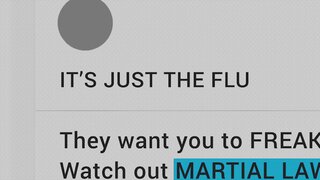Create a free profile to get unlimited access to exclusive videos, breaking news, sweepstakes, and more!
'If I Can't Have You Girls, I Will Destroy You': The Rise Of Incel Subculture
"Incel" is more than just a fringe internet buzz word. It's a social phenomenon driven by toxic masculinity, loneliness, social media, and an extreme hatred of women.

In 2014, a 22-year-old virgin from Santa Barbara, California made a series of disturbing YouTube videos.
He filmed sunsets and walks in the park while he chatted about his inability to make friends and speak to girls. He told the camera he was “rotting in loneliness” and referred to his virginity as an “injustice.” He uploaded videos with titles like, “Why do girls hate me so much?” and “Life is so unfair because girls don’t want me.”
His last video took a sinister turn.
"For the last eight years of my life, since I hit puberty, I've been forced to endure an existence of loneliness, rejection, and unfulfilled desires, all because girls have never been attracted to me,” it began.
“I don't know why you girls aren't attracted to me but I will punish you all for it.”
But his deadly rampage had already begun. Before recording himself, Elliot Rodger stabbed his two roommates and their friend to death inside his apartment. Afterward, he drove to the University of California Santa Barbara where he attempted to gain entry to a sorority. When he couldn’t get in, he shot three women outside, killing two of them. He then sped through Isla Vista, striking and gunning down pedestrians in his black BMW 328i luxury coup. After crashing his car, he shot himself in the head.
Six people were killed that day, and another 14 were injured. The murders horrified the country. But on the fringes of the internet, as BBC News noted, Rodger was celebrated by a small but growing community of other like-minded individuals: lonely, disgruntled men who could not form romantic relationships — and who hated women for it.
What are "incels?"
These call themselves "incels" — short for "involuntarily celibate" — and their presence was then largely confined to message boards on Reddit, 4chan, and the dark web.
“Incel[s] [are] men who would like to be in sexual relationships, have girlfriends, and so forth, but feel that modern society has made it such that women won’t date them — it’s impossible for them to get dates,” explained Heidi Beirich, director of the Intelligence Project at the Southern Poverty Law Center, whose work focuses on various forms of extremism.
There have been other attacks inspired by incel culture.
Rodger’s videos, including a 141-page manifesto he wrote entitled “My Twisted World,” became lightning rods for the incel movement and cemented him as a messiah and “patron saint” in the subculture. But at the time, the term "incel" was relatively unknown.
That all changed in 2018 when Alek Minassian, a 25-year-old Canadian man, rammed a van into a crowd of pedestrians in Toronto, killing 10 people. Eight of his victims were women. Some falsely speculated ISIS were responsible, especially given the method of the attack and the frequency of other such vehicular attacks in the U.S. and Europe at the time.
But Minassian’s final Facebook post revealed otherwise: He had been radicalized, not by jihadists, but by toxic masculinity.
“The Incel Rebellion has already begun!” Minassian posted. “We will overthrow all the Chads and Stacys! All hail the Supreme Gentleman Elliot Rodger!”
Minassian’s cryptic post glorifying Rodger thrust incel subculture and its lexicon — including words and phrases like “Chad,”“Stacy,”“femoid,”“normie,” and “redpilling” — into the mainstream.
“[Incels are] very hostile to good-looking women, who they refer to as ‘Stacys,’ and to good-looking men who they tend to refer to as ‘Chads,’ who they think are taking all the sexual oxygen out of the room,” Beirich added. “They feel that they’ve been left out, they’re extremely angry towards women, and in some cases, like the van attack in Toronto — Alek Minassian — some of these incidents turn to violence.”
Some members of the incel community praised Minassian in the same way they applauded Rodger’s vicious killings years earlier: with glee.
"That moment when this random dude killed more people than the supreme gentleman Elliot,” said Crustaciouse, a user on incels.me, according to Southern Poverty Law Center. “I hope this guy wrote a manifesto because he could be our next new saint."
Another user posted, “I have one celebratory beer for every victim that turns out to be a young woman between 18-35.”
Just months after Minassian’s rampage, disgraced substitute teacher Scott Paul Beierle gunned down two women and injured five others at a Tallahassee, Florida yoga studio. BuzzFeed News first reported that Beierle’s social media activity included a torrent of sexist YouTube videos and other evidence that he identified as an incel. Beierle had a history of harassing women, and like Minassian, idolized Rodger, according to Newsweek.
And on January 20, police in Provo, Utah arrested 27-year-old Christopher Wayne Cleary on terrorism charges after he reportedly posted about going on a shooting spree because he was a virgin.
“All I wanted was a girlfriend, not 1000 … not a bunch of hoes,” Cleary wrote in the now-deleted post, according to a statement given to Oxygen.com by the Provo Police. “I’ve never had a girlfriend before and I’m still a virgin, this is why I’m planning on shooting up a public place soon and being the next mass shooter cause I’m ready to die and all the girls the turned me down is going to make it right by killing as many girls as I see.”
According to the police statement, Cleary was already on probation in Colorado for felony stalking and threatening women.
Experts are now concerned that incel subculture could inspire future attacks and spawn tomorrow’s mass murderers. Misogynistically motivated crimes — and sexist mass murderers — aren’t a new phenomenon. In 1980, for example, Marc Lépine, shot 14 women to death at an engineering college in Montreal, Quebec. Before opening fire with a semi-automatic rifle he shouted, “I hate feminists!”
But Minassian’s attack was significant for another reason: It marked the first major example of domestic terrorism committed in the name of a particular group organized around extreme misogynism.
“Violent misogyny has a very long history,” said Chris Messerole, a fellow at Center for Middle East Policy at the Brooking Institute, whose research focuses on countering violent extremism.
“But it's almost always as a part of a broader ideology,” he added. “It's very rarely at the center of an ideology. An example would be jihadist groups, who many of, are also blatantly misogynist and sexist. What's different about the incel movement is that it's a movement defined, and organized, and coordinated around the misogynistic violence itself. And that's something that's new and that we haven't seen before.
Incels use violent language regularly, too.
Indeed, incels — many of whom have limited social skills, low self-esteem, and a heightened sense of entitlement — have constructed an entire online ecosystem. They troll message boards, anonymously dehumanize women in chat rooms, and often use a distinct vocabulary to reinforce their sense of belonging. They call women “cum dumpsters,” use derogatory acronyms like “AWALT” (which stands for “all women are like that”), and swap rape fantasies.
“You don’t think about throwing acid [on women] if you're happy,” said Deborah Tolman, a professor of psychology at the City University of New York. “You don't think about throwing acid if you feel good or if you feel connected to other people. It’s anger, it’s fear, it’s sadness, it’s feeling isolated, and not knowing what to do about it.”
In rarer cases, incels talk about killing women, other men, and sometimes, themselves.
“All pregnant women deserve to fall down a flight of stairs and lose their baby,” one incel posted.
Another wrote: “I wanted to inflict pain on all young couples... I wanted to kill them slowly, to strip the skins off their flesh, as they scream in torment. They deserve it for what they've done to us.”
Toxic masculinity, Tollman said, often drives this type of violent rhetoric.
“Masculinity is a psychological process,” she explained. “ It’s [the] messages that we all get about how boys are supposed to be — and not be. And the things they’re supposed to be are things that are usually associated with power."
How do incels defend themselves?
But Kalerthon Demetro — who goes by the pseudonym Jack Peterson— is a former chatroom administrator of incels.me and a self-professed spokesperson for the subculture who believes that not all incels are hateful or sadistic.
“A lot of the guys who join these kinds of websites, they experience a lot bullying in school, but more specifically, bullying by girls,” Peterson told Oxygen.com. “That’s what happened to me and that’s what happened to a lot of people in the incel community.”
Peterson, who widely disavowed the Toronto van attacks, thinks the incel phenomenon has been mischaracterized. He believes the vast majority of incels use social media as an outlet and support system for the loneliness they feel, rather than as a vehicle for hate. He also said that incels who use online platforms to debase women are speaking ironically and are predominantly harmless.
“Most of the media tends to focus on the violent, misogynistic aspects,” he added. “I feel like that's kind of a small, vocal minority in the group. There’s a certain percentage of it that probably is genuine. But in my opinion, the majority of that stuff is people kind of venting using extremely dark humor.”
Peterson, who left the incel community after members turned on him for his comments to the media, noted there was an uptick in violent rhetoric on incel forums in the aftermath of the Toronto van attack.
“I think people wanted to shock the many journalists who were coming to the website,” he explained.
What's the origin of the term "incel?"
Incidentally, the meaning of the word ‘incel’ hasn’t always been used to describe misogynists, sexually frustrated men, and mass murderers like Rodger, Minassian, or Beierle.
“[Incel] originally meant someone, of any gender or orientation, who would like to be dating, having sex, or in a relationship, but has not done so for a long time,” said Alana, a Canadian woman and management consultant who first coined the term in the 1990s, and who asked Oxygen.com to not use her full-name.
“The term was meant for people who remain virgins well into adulthood, but also applies to people who have had sex at some point but still have great difficulty finding a partner,” she added.
Alana pioneered a website in 1997, which she intended to “provide support and resources for adults of any gender who were long-term singles with dating difficulties.” She called it “Alana’s Involuntary Celibacy Project.” But in the years since the site’s conception, Alana said that straight, lonely, and sexist men bastardized the term "incel" and hijacked its true meaning.
“There was a gradual shift of the online incel forums, from all genders and orientations, to exclusively male heterosexuals,” she explained. “There was also a shift from mutual self-help to overcome loneliness, into mutual reinforcement of hatred of women.”
Can the rise of incel culture be stopped?
Despite claims, often by incels themselves, that their misogynism on social media is ironic, shouldn’t be taken seriously, or is just a form of “venting,” experts like Messerole believe it’s this toxic rhetoric that’s turned incel message boards into a potential breeding ground for mass murderers and domestic terrorists.
“There's this small sliver of folks who have a propensity to violence, and they see that support that the movement overall has, and they view that as license and moral sanction to actually justify and carry out their violence. That's what happened with Elliot Rodger, that's what happened with Alek Minassian, and that's why it's so important to isolate and counter the movement and the rhetoric within this movement," Messerole said.
Messerole noted it’s largely up to online platforms to crack down on incel hate speech to deter future attacks from occurring. Reddit, for instance, banned its incel message boards in November for inciting violence against women.
“If there's no broader community that espouses the same views as them, they're much, much, much less likely to carry out an actual attack.”






























